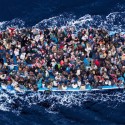“I don’t know how many more people need to die at sea before something gets done. The fact is that as things stand we are just building a cemetery within our Mediterranean sea,”
The statement came from Malta’s Prime Minister Joseph Muscat after another unseaworthy vessel carrying migrants capsized in the Mediterranean.
It’s estimated at least 348,000 asylum-seekers have made the risky journey on major sea routes since January. With conflicts in Libya, Ukraine, Syria, and Iraq, Europe has seen the highest number of sea arrivals — more than 207,000 crossing the Mediterranean.
A series of shipwrecks in October 2013 saw close to 400 recovered bodies not far from the Italian island of Lampedusa. The island’s Mayor, Giusi Nicolini called it “the biggest sea tragedy in the Mediterranean Sea since World War II.”
18-year-old Fanus was one of the survivors off the coast of Lampedusa. Fleeing the military dictatorship in Eritrea, she paid smugglers to get her through the Sahara and to Libya. From there she boarded the overcrowded unseaworthy fishing boat to embark on the final leg across the Mediterranean.
Sea water began to pour in when the boat’s bilge pump was no longer active. In an attempt to attract attention from the shore, the captain doused a blanket in petrol and set it alight only to have it burn his hand and drop the blanket, setting the boat on fire. The passengers scrambled for safety, but in rushing to one side of the boat, caused it to capsize.
Fanus was asleep but woke seconds before rolling into the water in darkness. Unable to swim, she thrashed about in the water, clinging to floating bodies to stay afloat. After four hours, she was spotted and rescued by the Italian coastguard. Of the 80 women on board, five survived. All children under the age of 12 drowned.
Praise for the Italian coastguard’s quick response came from the United Nations High Commissioner for Refugees; Italy announced a national day of mourning and held a state funeral for the asylum seekers who died. President of the European Commission Jose Manuel Barroso pledged 30 million euros toward the support of refugees in Italy.
In the High Commissioner’s annual Dialogue on Protection Challengers, held in Geneva on the 10-11 December 2014, Mr. António Guterres said, “I believe a majority of the people on those boats are not economic migrants, but fleeing conflict and persecution, desperately looking for a place to live in peace. The growing number of women, children and elderly people being rescued is testimony to this fact. If entire families are risking their lives at sea today, it is because they have already lost everything else, and see no other option to find safety.”
Indeed a worldwide diaspora is flowing into the Bay of Bengal, the Caribbean, the Gulf of Aden, the Red Sea, and the Mediterranean. The unprecedented exodus creating political debates among many nations. Guterres said governments are increasingly seeing keeping foreigners out as a higher priority than upholding asylum.
“This is a mistake, and precisely the wrong reaction for an era in which record numbers of people are fleeing wars,” Guterres said. “Security and immigration management are concerns for any country, but policies must be designed in a way that human lives do not end up becoming collateral damage.”
After the Lampedusa tragedies, Italy launched their highly praised Mare Nostrum search and rescue operation which has saved the lives of over 150,000 shipwrecked asylum seekers since October 2013. Their 9 million euros-a-month mission was a proactive search covering 27,000 square miles of sea.
At about the same time, but without the same fanfare, Australia launched their border protection program: Operation Sovereign Borders. It has received immense criticism, peaking with Australian MP Andrew Wilkie’s formal request in October 2014 to the International Criminal Court to probe Australia’s asylum seeker policy; Wilkie makes the case that Australia’s policy is a violation of human rights and seeks to bring Prime Minister Tony Abbott and Immigration minister Scott Morrison before the international court.
Operation Sovereign Borders came under heavy fire this year with 53 international law scholars from 17 Australian universities uniformly condemning the government’s decision to return 41 Sri Lankan asylum seekers back to the Sri Lankan government. Law experts say it is a violation of international law to send vulnerable people back to persecution and torture.
A second boat carrying 153 asylum seekers, the majority identified as Sri Lankan displaced Tamils was also intercepted by the Australian government. The boat was kept at sea for more than a week in legal limbo before sent to a refugee camp for processing. A lawyer representing those on board expressed concern that they may also face the same fate of being sent back to Sri Lankan authorities without having their claims of torture, persecution, and death fairly heard.
Perhaps the most unsettling comment came from George Newhouse, an Australian human rights lawyer: “It’s like giving Jews back to the Nazis.”
With the number of displaced asylum seekers taking to the seas continuing to rise, developed nations indeed struggle to deal with the issue. Guterres made an appeal, ”Focusing on border control and deterrence will not solve the problem. Security and immigration management are concerns for any country, but policies must be designed in a way that human lives do not end up becoming collateral damage.”
Weighing in on the issue, U.N. High Commissioner for Human Rights Zeid Ra’ad Al Hussein remarked, “Rich countries must not become gated communities — their people averting their eyes from the bloodstains on the driveway.”
The UNHCR has made promising plans for 2015 to ensure the safeguarding of asylum seekers. 2014 saw the EU adopting the Asylum, Migration and Integration Fund which represented a commitment of over 3 billion euros for the next seven years (2014-2020) to improve asylum systems, reception modalities, and integration policies.
To address root issues, the UNHCR and partners have launched a major humanitarian and development appeal, requesting more than US$8.4 billion to provide support for 12 million displaced people in Syria; Syrians making up a large number of boat people.
One of the key partners in the initiative, Jan Egeland, secretary general of the Norwegian Refugee Council gives a call to action to the international community — to move beyond simply guarding their borders, “2015 should be the year when we finally provide protection and relief for those caught in the cross-fire.”
The strategy of dealing with displaced individuals before they leave their shores may very well be more profitable and effective than engaging with them once they’re on the seas.

























